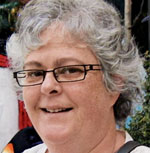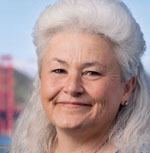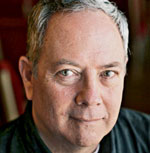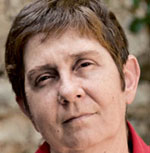sierraclub.org - sierra magazine - nov/dec 2011 - the coal stops here
MODERN MUIRS
Newly minted Sierra Club heroes
By Michael Brune
It's great that you can find Sierra Club founder John Muir's image on a quarter, but he's hardly the only heroic figure from our past. Club legends like Ansel Adams, David Brower, and Edgar Wayburn all made monumental contributions to conservation. Without any one of them, the American landscape we love would look very different.
The good news is that the age of Sierra Club heroes is still going strong. While it would be hard for anyone to open as many people's eyes to the beauty of wilderness as Ansel Adams did, or to convince Congress to protect as many millions of acres of wildlands as Edgar Wayburn did, Sierra Club people still do extraordinary things every day. Here are just a few examples:
 Verena Owen has been the lead volunteer on the Club's Beyond Coal campaign since the beginning, in 2003, back when it seemed like new coal-fired plants would be unstoppable in her home state of Illinois. What actually proved to be unstoppable were Verena and the rest of the Beyond Coal team. Nearly a decade later, they've helped block more than 150 proposed plants nationwide. This year, Bloomberg Philanthropies recognized that remarkable achievement by investing $50 million in the campaign that Verena helped start.
Verena Owen has been the lead volunteer on the Club's Beyond Coal campaign since the beginning, in 2003, back when it seemed like new coal-fired plants would be unstoppable in her home state of Illinois. What actually proved to be unstoppable were Verena and the rest of the Beyond Coal team. Nearly a decade later, they've helped block more than 150 proposed plants nationwide. This year, Bloomberg Philanthropies recognized that remarkable achievement by investing $50 million in the campaign that Verena helped start.
 When Lynn Henning was awarded the prestigious Goldman Environmental Prize for North America last year, we were proud—but not surprised. Lynn and her husband, Dean, farm 300 acres of corn and soybeans in Lenawee County, Michigan, within 10 miles of a dozen of the polluting factory farms known as concentrated animal feeding operations, or CAFOs. Lynn gathered as much information as possible about animal-waste spills—including water samples—and began organizing in her community. She ultimately gained the attention of the federal EPA and prompted state regulators to issue hundreds of citations against Michigan CAFOs for water-quality violations. She's now a leader in the Club's Water Sentinels program.
When Lynn Henning was awarded the prestigious Goldman Environmental Prize for North America last year, we were proud—but not surprised. Lynn and her husband, Dean, farm 300 acres of corn and soybeans in Lenawee County, Michigan, within 10 miles of a dozen of the polluting factory farms known as concentrated animal feeding operations, or CAFOs. Lynn gathered as much information as possible about animal-waste spills—including water samples—and began organizing in her community. She ultimately gained the attention of the federal EPA and prompted state regulators to issue hundreds of citations against Michigan CAFOs for water-quality violations. She's now a leader in the Club's Water Sentinels program.
 The CEO of DuPont made a big mistake when he cut off Sam Booher's microphone after only 45 seconds during a shareholders' meeting. A retired Army lieutenant colonel who has held dozens of Sierra Club leadership positions over the years, Sam was voicing his concerns about a titanium strip mine that DuPont wanted to put next door to Georgia's Okefenokee National Wildlife Refuge. Turns out DuPont could silence Sam at the meeting, but it couldn't stop him: He went on to help lead a grassroots campaign that ultimately blocked that mine—and also led DuPont to take stakeholder concerns about new mines more seriously.
The CEO of DuPont made a big mistake when he cut off Sam Booher's microphone after only 45 seconds during a shareholders' meeting. A retired Army lieutenant colonel who has held dozens of Sierra Club leadership positions over the years, Sam was voicing his concerns about a titanium strip mine that DuPont wanted to put next door to Georgia's Okefenokee National Wildlife Refuge. Turns out DuPont could silence Sam at the meeting, but it couldn't stop him: He went on to help lead a grassroots campaign that ultimately blocked that mine—and also led DuPont to take stakeholder concerns about new mines more seriously.
 In the wake of Hurricanes Katrina and Rita, the Federal Emergency Management Agency (FEMA) distributed thousands of aluminum trailers to homeless Gulf Coast residents. When Becky Gillette, then a volunteer with the Club's Mississippi Chapter, started hearing about people in the FEMA trailers waking up with nosebleeds, hacking coughs, and headaches, she suspected that formaldehyde was responsible. Becky ordered test kits and was shocked to discover that 30 of the 32 trailers she checked had unsafe formaldehyde levels. Thus began a long campaign that not only forced FEMA to acknowledge that the trailers were making people sick but also brought national attention to the danger of formaldehyde-treated wood. Last year, President Barack Obama signed a bill that limits the amount of formaldehyde in hardwood plywood, particleboard, and medium-density fiberboard.
In the wake of Hurricanes Katrina and Rita, the Federal Emergency Management Agency (FEMA) distributed thousands of aluminum trailers to homeless Gulf Coast residents. When Becky Gillette, then a volunteer with the Club's Mississippi Chapter, started hearing about people in the FEMA trailers waking up with nosebleeds, hacking coughs, and headaches, she suspected that formaldehyde was responsible. Becky ordered test kits and was shocked to discover that 30 of the 32 trailers she checked had unsafe formaldehyde levels. Thus began a long campaign that not only forced FEMA to acknowledge that the trailers were making people sick but also brought national attention to the danger of formaldehyde-treated wood. Last year, President Barack Obama signed a bill that limits the amount of formaldehyde in hardwood plywood, particleboard, and medium-density fiberboard.
These folks represent just a tiny sampling of the Sierra Club heroes who step up every day to protect their communities and the environment. Whenever I visit a local Club group or chapter, I meet people like Verena, Lynn, Sam, and Becky, who remind me just how much difference one determined person can make. You don't need to be on a quarter to be a hero.
is the executive director of the Sierra Club. You can e-mail him at michael.brune@sierraclub.org and follow him on Twitter and Facebook.
Photos, from top: Martin Sundberg; courtesy of Pete Owen; courtesy of the Goldman Environmental Prize; courtesy of Lindsey Lingenfelter; courtesy of Richard Quick